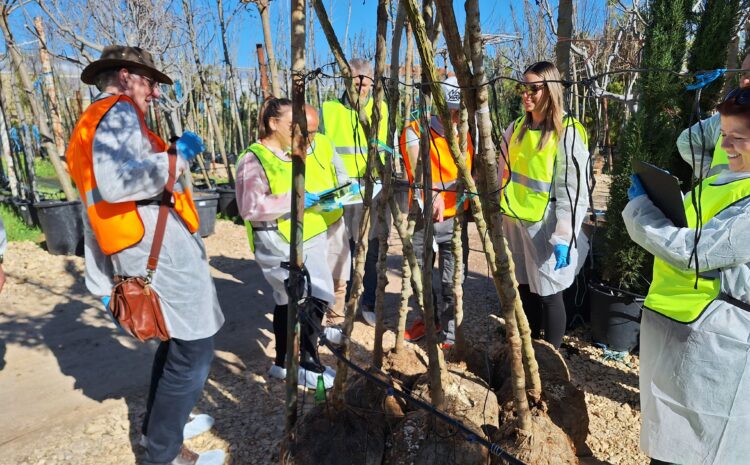
Raising Preparedness Through Simulation Exercises
The Plant Protection Organizations of the Western Balkans are actively enhancing their preparedness for managing outbreaks of the most harmful pests that could impact their agriculture, forestry, and natural environment. As part of the PHWB project, several contingency plans have been prepared for European Union priority pests, communication strategies have been planned, and simulation exercises have been organized. Currently, we are in the preparatory phase for a simulation exercise on the Fall Armyworm (Spodoptera frugiperda), which will be held in October in North Macedonia.
During the three working days between 19 and 21 March 2024 in Zadar (Croatia), the first simulation exercise was organized to tackle a simulated outbreak of the Asian Longhorn Beetle (Anoplophora chinensis) in cooperation with the Croatian Plant Protection Organization. In total, 25 participants from competent authorities responsible for plant health in WB6, together with experts from the project, exchanged their experiences and assessed their capability to handle a major outbreak of Anoplophora chinensis. This beetle is one of the priority pests with the risk of being introduced through live woody plants such as bonsai and nursery stock. Its infestation has a significant impact on fruit trees, park trees, and forest trees.
The Exercise and Its Implementation
The exercise began with initial training, followed by a day-and-a-half tabletop exercise held in a meeting room, and a half-day field exercise at the outbreak location. The exercise parameters, provided to participants in advance through a simulation manual, included a fictional but realistic scenario featuring a nursery with host plants near an urban area and a natural environment in a real demarcated area where official eradication measures had been implemented. The scenario unfolded in simulated time and space, with additional information injected after the initial detection of the priority pest, from suspected presence to confirmed presence by an official laboratory, and its spread within the infested zone. According to regulations for all Union quarantine pests, immediate phytosanitary action is required to eradicate the pest or, if that is not possible, to contain it.
During the first exercise, objectives such as preparedness, mitigation, regional response, and communications were addressed. The project also developed a manual with a toolbox to prepare the simulation exercises and transfer knowledge on conducting them. This manual provides plans, templates, and examples designed to assist Plant Protection Organization (PPO) officials in ensuring strategic-level support from decision-makers, establishing an exercise program within the organization’s emergency or preparedness plans, and guiding PPOs through all necessary steps in conceptualizing, designing, planning, coordinating, conducting, and evaluating simulation exercises.
Participants preferred the field exercise over the discussion-based tabletop exercise. The most challenging aspect for the PPOs was defining participants’ roles and responsibilities for managing the consequences of a confirmed presence of a quarantine pest according to contingency plans, policies, and procedures. The tabletop exercise proved to be an effective tool for testing the Pest Specific Contingency Plan, which had been developed for Anoplophora chinensis for the CEFTA region by another regional project run by GIZ (https://www.giz.de/en/worldwide/139352.html).
Despite the lack of specific guidelines for cooperation with neighbouring PPOs in cross-border outbreaks, the results and conclusions were favourable and focused on building relationships between PPOs (other stakeholders were not present).
Development of Simulation Exercises for the Plant Health Sector
The plant health sector has limited experience in participating in or organizing simulation exercises. Some experience has been gained in Europe through EPPO workshops and the Better Training for Safer Food Academy, which have conducted functional and tabletop exercises. A successful scenario-based field exercise was implemented in Valencia, Spain, where groups of participants acted as an outbreak management team in response to the discovery of a quarantine pest (Aragón, 2022).
Participating in multi-country scenario trainings, like those available from 2020 and coordinated by HaDEA (https://better-training-for-safer-food.ec.europa.eu/training/) and EFSA (https://www.efsa.europa.eu/en/supporting/pub/en-8222), has proven to be an effective method for simulating a broader pan-European response and establishing connections with counterparts in different Member States.
In Central America, the regional plant protection organization OIRSA has started field exercises on some transboundary plant pests, and tabletop exercises have been run in the UK and Australia. Recently, the IPPC community implemented an international field exercise (named drill) with scenarios on a farm and in a diagnostic laboratory, as an exchange between Central America and Africa (Simulation exercises: A crucial tool in combatting emerging pests – Convention internationale pour la protection des végétaux (ippc.int)).
In Europe, simulation exercises in plant health are not something that EU member states have been doing for years, and the WB6 need to catch up. However, this is an area where all countries need to improve by experimenting and learning from other sectors and countries. The Regional Simulation Exercise Toolbox for Plant Health for the Western Balkans is the first pilot guidance model aimed at organizing practical and effective simulation exercises in the sector. As such, it offers significant opportunities for improvement, so its testing is an objective of each of the following simulation exercises (Spodoptera frugiperda and Xylella fastidiosa).